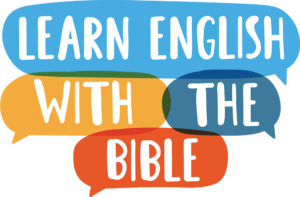Beginner Lesson 2
Creation -
Day 1
Grammar Exercise

Countable and Uncountable Nouns
A noun is the name of something.
It can be a person, like “James” or “waitress.”
It can be a place, like “library” or “America.”
It can be a thing, like “cat” or “love.”
Nouns can be countable or uncountable.
Countable Nouns
Nouns can be countable. This means you can count them, like “5 oranges” or “many chairs.” Look at these examples:
one cat
two cats
many cats
You can ask “How many cats do you have?” That is “how many” followed by the plural noun (cats).
How many cats do you have?
I have many cats.
How many baskets of leftovers did you pick up? (see Mark 8:18-19)
We picked up twelve baskets.
Countable Nouns and Articles
In lesson 1, we learned about the articles a, an, the, and some. These articles can be used with countable nouns like clock, apple, and giraffe. Remember, countable nouns usually need an article.
a clock
some giraffes
an apple
the Spirit of God
Uncountable Nouns
Some nouns can’t be counted, but they are still nouns. They may be feelings like anger or joy. They may be ideas like love or safety. They may also be used for physical objects that are too many or too small to count, like sugar, tea, and air.
You can ask, “How much sugar do you have?” That is “how much” followed by the uncountable noun. The answer cannot be a number, but it can be a quantity like “a little bit” or “too much.”
How much sugar do you have?
I have a little bit of sugar.
(Do not say “I have three sugar.”)
How much bread do you have? (Mark 6:38)
We have five loaves of bread.
(Do not say “I have five bread.” You can say you have five loaves, because loaf is countable. The plural of loaf is irregular – loaves.)
Uncountable Nouns and Articles
Can You Use “A” or “An” with Uncountable Nouns?
You can’t use a or an with uncountable nouns. Why not? There is never just one of an uncountable noun because it can’t be counted. We can’t say “an anger” or “a rice.”
Your anger lasts a little while, but your kindness lasts for a lifetime. (Psalm 30:5)
Can You Use “Some” with Uncountable Nouns?
You can use the plural article some with uncountable nouns. You can say “some kindness” or “some rice.” We can use a word like his or my instead of an article. You can say “his kindness” or “my rice.”
The Lord God took some soil from the ground and made a man. (Genesis 2:7)
Can You Use “The” with Uncountable Nouns?
We can use the article the with uncountable nouns. Remember in lesson 1, we learned that the can be used with plural words. You can say “the oil” or “the love.”
…use the oil from your olive trees or drink the wine from grapes you grow. (Micah 6:15)
…by the love that comes from the Holy Spirit… (Romans 15:30)
Uncountable Nouns Use Singular Verbs
Even though they talk about plural things, like loyalty or bread, uncountable nouns usually do not have a plural form. You can’t say “rices” or “waters.” Uncountable nouns are used with singular verbs. Look at these examples:
The research is finished.
Knowledge is valuable.
Her hair is red.
Sometimes Nouns Can Be Countable and Uncountable
Sometimes nouns can be both countable and uncountable! It just means that a word may have several meanings.
For example, God created light, but it is not the same as the lights on my Christmas tree, or a light on my table. The lights on my Christmas tree and on my table are countable. They mean different things.
This might be confusing, but it helps you understand what a word means. Here’s an example:
God called the light “day.”
This is uncountable and singular.
The lights on my Christmas tree are red.
This is countable and plural.
Do you see how articles can help you understand the meaning of a word?
Conclusion
I hope this has helped you understand a little more about articles and when to use them. Only three little words – a, an, and the – but maybe you feel like you will never understand the rules.
Don’t worry! Native speakers don’t usually understand the rules, either. They have learned what “sounds right” and what “sounds wrong.” In the same way, the more you practice reading and listening to English, you will also learn what “sounds right.”
Practice Makes Perfect!
When you learn new grammar, practice by using it as much as possible. Do this worksheet about countable and uncountable nouns.
Now click the button to go to the writing exercise.
